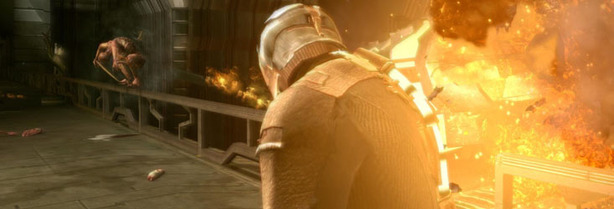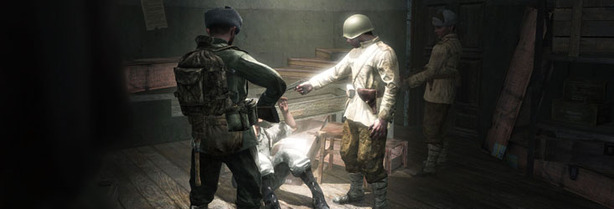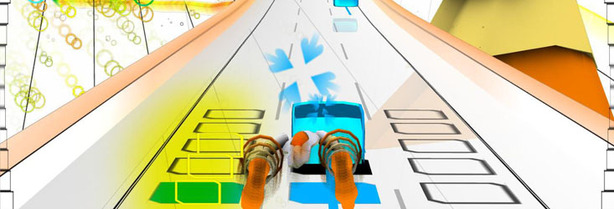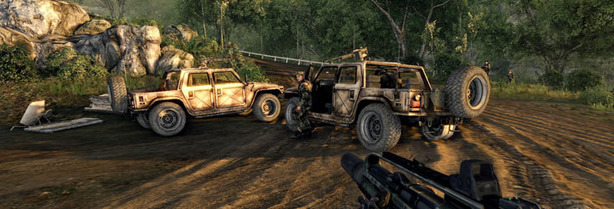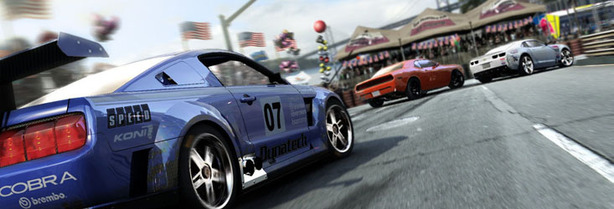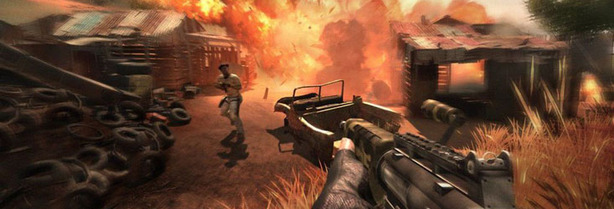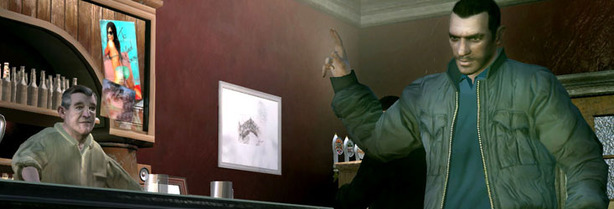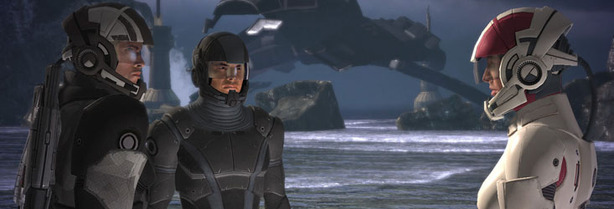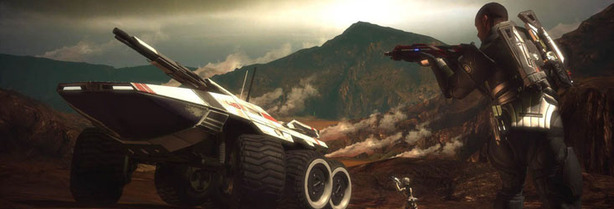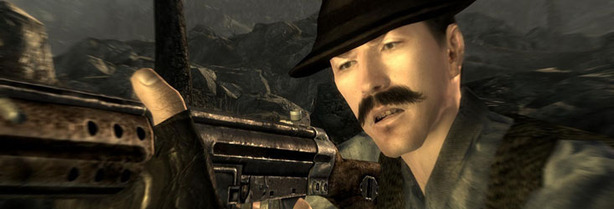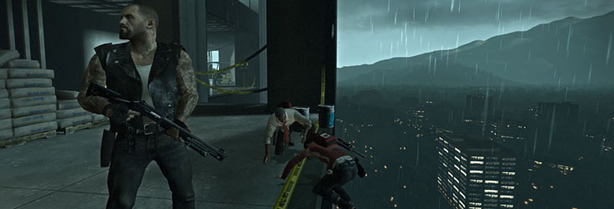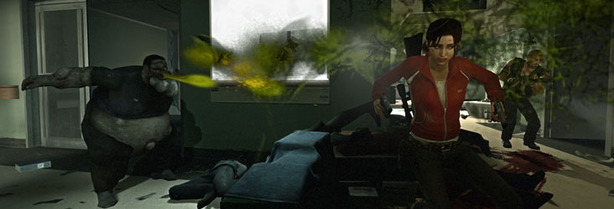Ten – Dead Space
Publisher: Electronic ArtsFull Review HereDead Space felt a little bit clunky on the PC and was undoubtedly designed for consoles first, but while that may have held the game back just a little there’s still no denying that it’s one of the best and scariest third person shooters of this year. Arguably, it’s the game that
Doom 3 should have been.
Dead Space is about a rescue and repair team that responds to an emergency broadcast but quickly finds themselves in over their heads. What the team had expected to be a series of purely mechanical failures turns out to be something a lot more sinister.
EA has produced something worth more than the sum of its parts and the game becomes a truly rewarding experience.
Nine – Call of Duty: World at War
Publisher: ActivisionFull Review HereWorld at War is, it has to be said, not as strong an entry in the series as last year's
Modern Warfare and the shift from Infinity Ward back to Treyarch has caused some problems for the franchise. The move to modern times was very well received, so taking things back to World War II was always going to be a risky move.
World at War is a great little game, stringing together the most iconic moments of the war by taking inspiration from the likes of
Enemy at the Gates. Couple that with some awesome voice work from high profile celebrities like Kiefer Sutherland and
World at War plays more like a Hollywood war movie than any other
Call of Duty in a long time.
The combination of questionable presentation and classic gameplay doesn’t work as well as it once did, but nor does it fall totally flat –
World at War is still a very enjoyable game.
Eight – Audiosurf
Publisher: IndependentFull Review HereAudiosurf was one of the highlights of our gaming year and it’s very gratifying to see that the same is true for our readers. Having burst onto the gaming scene quite unexpectedly earlier this year,
Audiosurf is the creation of indie developer Dylan Fitterer who ushered this arcade gem onto Steam in early 2008.
Along similar lines to
Guitar Hero,
Audiosurf is a reflex-based game where players have to collect coloured bricks in a grid, matching similar colours to free up spaces and win points. It sounds complex, but it really isn’t.
What makes
Audiosurf stand apart though is the fact that it doesn’t rely wholly on a fairly limited and preset tracklist, like the
Guitar Hero games do. Instead, it lets players upload their own music into the game, reading each track and creating a level based on the tempo and melody of that song.
Slow climaxes are represented as dawdling uphill stretches with occasional blobs of colour while pounding finales appear as downhill sprints through huge tunnels, colours flashing before your eyes like the life of a stuntman. As the tunes wax and wane the levels fall and rise, twist, turn and pulse to whatever beat you’ve chosen.
Seven – Crysis: Warhead
Publisher: Electronic ArtsFull Review HereWhen the original
Crysis was released it was a subject of much debate because, while the game definitely looked good and played OK, the steep hardware requirements meant that the definitive
Crysis experience was off-limits for many.
Borrowing an idea from other Electronic Arts partner Valve,
Crysis: Warhead tells a parallel story to the original game, following the original plot and timeline but from a different viewpoint. Instead of playing through the eyes of Nomad, players take the role of Psycho – the less restrained Jason-Statham-alike of the original game.
Trapped on the other side of the island to Nomad, Psycho is pursuing objectives of his own as he evades aliens, kills Koreans and tries not to freeze to death in the flash-iced tropical island. It’s all south of FUBAR and all Psycho has is his stiff upper lip and an assault rifle.
Warhead though, Crytek showed that it understood how a linear, scripted experience can often be more powerful than an open sandbox one.
Six – Race Driver: GRID
Publisher: CodemastersFull Review HereRace Driver: GRID looks like just any other racing game if you take it at face value. It’s got lots of narrow little street races, shiny cars and remarkably high polygon counts and a design which means you can’t really do very well until you’ve learned the tracks like the back of your hand.
GRID is sharper than
your first lemon and slicker than the world's biggest water slide, with players zipping up and round the tracks faster than we can come up with witty analogies. The corners are tight, the competition fierce and the in-game physics so realistic that you’re lucky if you aren’t thrown out of your chair if you take a corner too hard.
If you do take a corner too hard then you’d better expect to feel the damage on your car too – the damage models are jaw dropping and you can come up with some truly fantastic crashes if you want to. Or if you’re just an awful driver like me. Either way, you can almost taste the burning metal as the gravel tears away the paint – that, combined with the accessible simulation-cum-arcade gameplay, makes
Race Driver: GRID easily better than any other racing game we’ve seen this year.
Five – Far Cry 2
Publisher: UbisoftFull Review HereFar Cry 2 may have got some of you down with some fairly repetitive missions, but it’s hard to deny how much innovation and beauty there is in the game. Ubisoft’s follow-up to the original
Far Cry may have no connection to the first game in terms of story or location, but it captures that sense of strategic freedom perfectly.
It casts players as a simple mercenary, one of many operating in the African savannah, all of whom are trying to take down a local gun runner called The Jackal – a man deeply entrenched in the politics of a civil war.
Finding where The Jackal is won’t be easy though – and nor will killing him. At the start of the game you’re already indebted to local factions, pretty much defenceless and coming down with malaria. You need friends, supplies and medicine. You’ll need to wade deep into the local war and earn all these things.
With a smattering of original ideas, such as the cool healing system, and the best flamethrower in the history of gaming,
Far Cry 2 definitely deserves to be on this list.
Four – Grand Theft Auto IV PC
Publisher: RockstarFull Review HereRockstar has made the best
Grand Theft Auto game ever this year.
Looking at the game as a whole,
GTA IV PC isn’t wholly different from any of the other
Grand Theft Auto games. You play a guy, down on his luck and involved with the wrong people, who starts a life of crime in an American city and starts to rise from lowly gangster to feared crimelord. Along the way there are plenty of car crashes and chases, as well as the occasional RPG.
What makes
Grand Theft Auto IV PC a little bit different though is that it’s the first game in the series that is really starting to take itself seriously. There glaring neons of
Vice City and the rampant attitude of
San Andreas have been fairly traded in for muted browns and bleak realism. It may not be to everyone’s tastes, but there’s obviously enough people out there who like it.
Three – Mass Effect PC
Publisher: Electronic ArtsFull Review HereTo say that
Mass Effect is a story like no other would be a little unfair as the game does tread very similar lines to some previous BioWare games, but the story at least has never been this well told. It’s the future and you.
It’s this ability to put players in ethical grey zones that’s always made BioWare games so very worth playing, whether they cast you as the human son of the God of Murder, the amnesiac Sith-lord who almost wiped out the galaxy or simply just a distinguished solider who gets caught up in the politics of a complex universe.
What makes
Mass Effect PC stand out is the sheer quality of the writing, which gives each character an appreciable sense of realism. Saving the galaxy is all very well and good, but it’s the connection you make with your crew that really drives
Mass Effect PC forward and earns it a place on this list.
By giving player full real-time control of their players and a tactics overlay that pops up at a button press,
Mass Effect can be as action-driven or tactical as you want.
Two – Fallout 3
Publisher: Bethesda SoftworksFull Review HereSet in the future,
Fallout 3 tells the story of a young person who grows up in a Vault – a vast underground complex that exists to shield a clutch of people from the nuclear war that has raged above and devastated the world. Safely imprisoned underneath the ruins of Washington DC, all is good for you in your microcosm – until your father goes missing and Vault plunges into chaos. You flee to the surface in pursuit of your dad.
As soon as you get outside though, the entire game changes and the training wheels are taken off. You can go anywhere in the Capital Wasteland, revelling in this 50s view of a post apocalyptic future. There are funny-voiced and impossibly technical cyborgs at the corner of every ruined street, looming super mutants and giant scorpions warring against bandits and settlers.
One of the best innovations that’s been bought forward into
Fallout 3 though is Random Encounters – that old stalwart from the previous
Fallout games which ensures that the game is always going to be slightly different no matter how often or similarly you replay the game. You can never be sure when you might stumble across Uncle Lou or a flock of deathclaws.
Game of the Year – Left 4 Dead
Publisher: Valve, Electronic ArtsFull Review HereAnd really, there is a huge amount of talent that’s been poured into
Left 4 Dead. We’ve played games with friends, family and people who normally abhor computer games, but the cocktail of violence and teamwork has always gone down smooth and impressed our initially unwilling team mates.
The premise for the game is simple, with the story told more through subtle visual clues than the amazing
four minute cutscene that preludes the adventure. An infection has mutated nearly all of the human race, creating a race of savagely fast zombies that are hungry for the flesh of anyone who is left immune. That includes you and your three pals.
Using the same techniques as learned in
Team Fortress 2, Valve has created a series of recognisable characters amid the mob of frothing infected. There’s Bill, the war-weary Vietnam veteran, Hell's Angel Francis, college-girl Zoey and office worker Louis in his red tie and designer shoes. Each of them is armed to the teeth and desperate to get away from the infection.
Opposing them are a series of brilliantly balanced opponents; the huge Tank, the shy Witch, the vicious Hunter and Smoker. Oh, and vile bile-spilling Boomer too.
None of these characters stand out nearly as much as the faceless games master behind it all though, the AI Director that sits on the sidelines of each match and moves around key resources and enemies to match the pace of the game. The AI Director is the main source of frustration, elation and fun in the game and hating or loving it is something that the whole team can get involved in – and will do when it throws two tanks in a row at you!
The game isn’t wholly co-operative though and for those who fancy more of a competitive experience there’s the rather awesome Versus mode, which sees two teams of four take it turns to try and run through a map from Co-op mode. The problem of course is that the special infected are now played by the opposing team, who get full reign to terrorise and grief the humans.
The reality is instead that no specific part of
Left 4 Dead stands out because the whole game is fantastic. Everything is superbly polished, balanced, designed and made. There’s literally nothing in the game that feels more unfair than it should be. It’s within an inch of gaming perfection – which is probably why it stole almost half of the user vote!
With a fantastic multiplayer, co-operative and singleplayer experience and so much replayability
Left 4 Dead is game of the year
Read more...





